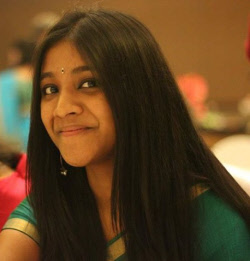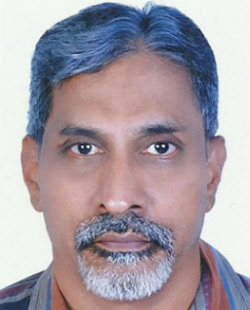Shreya, do you remember the first work of writing you produced? When was it and what did you write about?
I think the first work of writing I can remember producing is a family newsletter (for circulation within the household), when I was nine years old. I tried to make big stories out of small, everyday things in my world. The cover story was about my parents’ wedding anniversary, and inside I had a page titled “My happiest moment was…” and I asked everyone – sister, maid, parents, grandfather – what their happiest moment was. I’ll never forget my grandfather’s answer – “My happiest moment was when I first cried!”
Take us through your reading journey. From childhood to now, what are some memorable books/authors you have read and enjoyed?
The first books I can remember reading are the classic set – Enid Blyton, Judy Blume, Nancy Drew. After Enid Blyton’s books, Secret Seven and Mr. Meddle and Famous Five and Faraway Tree, I read Judy Blume. I remember finding the books so much more adult and grown-up and intense. It was so new to me. I loved Rachel Robinson, from Judy Blume’s ‘Here’s To You, Rachel Robinson’ and ‘Just As Long As We’re Together.’ She was so silent and strained and never felt fully free even with her family or friends, and she kept people at a distance despite desperately and sincerely caring about them. It was so sad, intimate, uncomfortable and honest reading about her. That left a mark on me.
I also loved Lois Lowry’s Anastasia series. Anastasia Krupnik was the funniest, bravest, most outrageous character I had ever read about, and felt like I knew. Nothing could bring her down – she could be banished to her room by her parents and she would still invent a fictional story about her goldfish and write pages about it. Nothing ever stopped her from imagining and forcing other people into this crazy world of hers, and by trusting them with it she made them beautiful too. She was such an inspiration to me.
More recently, Cheryl Strayed’s ‘Wild’ and ‘Tiny Beautiful Things’ have been very impactful, I felt they changed my life. I learnt from them something I hope to bring into my life – how to be searingly honest about your own life, how to approach grief and pain, how to share and be compassionate. I think I’m still trying to learn these things today, and I feel I’m working on them every day.
Your characters are usually in very interesting settings (and have interesting names). What do you have in mind when you decide on these character sketches?
That’s so nice to hear, I’m so glad you like them! This is a very interesting question because whenever I have consciously tried to make characters interesting, given them a name or made them live in a certain place or create a certain detail, they have been completely false. One can make out that I am just writing to be impressive and not because I really mean it. It makes for awful reading, too. But whenever I write because I truly see something in my mind, because I truly imagine a character in my head clearly and think of them as real people, then their personalities dictate and determine what sort of character sketching and details I write. So my job, then, is only to imagine them as best as I can without getting distracted by embellishment or writing with “literary value”. A big problem for me is that I am too conscious sometimes and try to impress people too much with my writing, and whenever I don’t do this, and manage to stay true, is when my characters are interesting, I think. So this question is a reminder for me to stay true!
What would you say are the sources of inspiration for your writing?
I think the main thing that inspires me to write is the feeling that there is something inside me that will not be fixed until I write it out. Sometimes the process of writing is scary (I’m finding that of late), because you’ve exposed your soul and you’re vulnerable and people will know everything about you. But in most cases, cases where I really feel inspired to write, I feel the benefit of writing means more than these risks.
The things that inspire me are my own life and conversations and details around me. For example, my friend used to drink a certain type of tea when she was growing up, and she lost track of it for years until one day at the college cafeteria, she found it again and it smelled exactly the way she remembered. Things like this fascinate me, and from this I’ll think of one thing and another, all make-believe, until I feel it’s a story I want to write.
What’s the biggest reward you have received as a writer?
I really love it when people tell me my writing made them feel emotional and connected to it, rather than “That was so good, you’re so talented.” This is especially because I feel that I write from my heart. I don’t always know if my writing is good or not, but I do know that it means something to me and when people tell me it means something to them, too, I feel very emotionally rewarded.
A good part of your writing is about women. How do you wish to contribute to the larger discussion on women issues?
I don’t know how important or qualified I am to be a voice in the greater discussion – I think I am an amateur – but to whatever little extent I can, I hope that through my writing I’m able to make people see that women are all so different from one another, and have so much inside them. I hope people don’t take their mothers serving them food for granted, or think that wives should pack their husband’s lunch boxes. I hope people see all women as individual people who have made a personal journey and are continuing to make a personal journey, with a very specific mental and emotional landscape inside them, rather than as one giant indistinguishable set of people whose thoughts and feelings are not valid or important. And I hope that sharing women’s stories, the way I try to, contributes to the larger discussion by giving women and their stories space and validity.
Lastly, please share a few words about your experience being a part of the Spark team.
I would like to thank Vani and Anupama, the editors of Spark. All their editing changes, suggestions and advice have made my writing better and have taught me and polished me from being a 17-year-old girl who didn’t know what she was doing.
Thanks also for supporting me through every time we worked on a submission together. Through the ups and downs, even when I must have annoyed you or been lacking, you helped me and taught me. I don’t take your reassurance and support for granted.
Thank you for allowing me to feel like part of a team. Seeing my name in the list of contributors makes me feel so honoured. I feel lucky to have my name displayed with so many amazing and talented people. To feel part of something, especially if you care so much about it, feels like a blessing for me. Thank you so much.
Shreya Ramachandran is a 20-year-old writer and student from Madras, attempting to write honestly about herself and her world.
Questions by Anupama Krishnakumar






